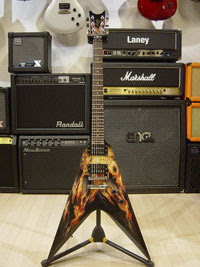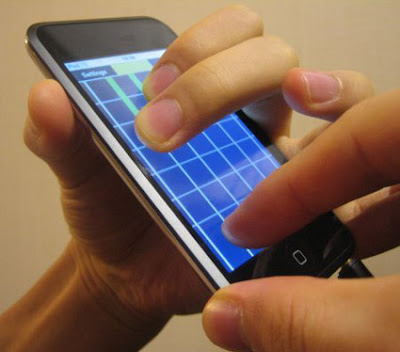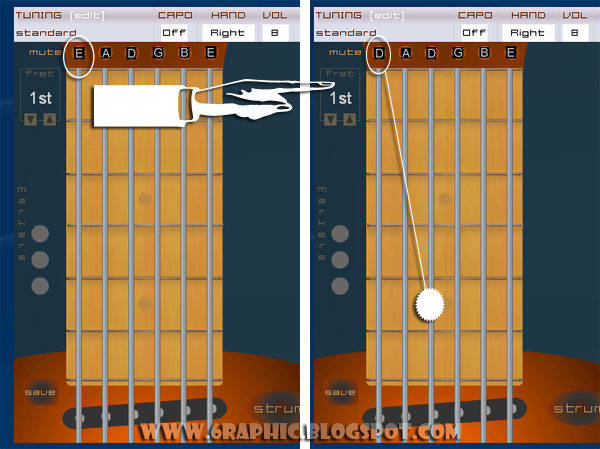Finger Memory
It's just like riding a bike you had to train yourself to balance, shove off and switch to pedaling all the while keeping your balance. I can teach you where to put your fingers but you have to put them there! Only you can make yourself good at it. This is the hardest thing you will ever have to learn! But the teacher is you.. so start teaching yourself now!
Here are a few good exercises to help coordinate your brain and fingers:
Pull-offs/Trills
Pull-offs and trills are great exercises to build hand strength and are a necessary element to lead guitar playing. The idea is to: hold the string with one finger and pull it off the string to the point where it feels as if the meat of your finger is plucking the string... You'll feel the string snap out from underneath the finger and in so doing the note you hold behind the one you just pulled off from will ring.

A trill is the process of hammering a finger down on a string and pulling of repeatedly. The hammer action causes a note to sound and pulling it off so that the note fingered behind it sounds. The only difference between a pull-off and a trill is that a trill is repeatedly really fast.
Guitar D Drop Tuning
 Drop D tuning (commonly known as 'dropped d') is very very very simple to get. Usually we can easily find this kinda trick when you hear about heavy metal stuffs.. I prefer to call it the industrial rock, rock music today.
Drop D tuning (commonly known as 'dropped d') is very very very simple to get. Usually we can easily find this kinda trick when you hear about heavy metal stuffs.. I prefer to call it the industrial rock, rock music today.
WHATEVER.. Lol..!!!
I'M IN CHARGE MISTER!!! Lmao!!!
It's easy ... All you have to do is lower the tone E (6th string) to D. Anticipation of its similarity to pluck the strings 4th (D string) and then pick the low E that you have sent down earlier. See what I've done below...
You guys don't need some hard move to your guitar power chords to get sound in tune, once you get that just like I said, it RULES!!!
Harmonics
 Harmonics are bell-like sounds that are achieved in various ways. For those of you who haven't done these before, i would recommend starting with the easiest. All you do is lightly touch each string directly over the 12th fret with any left-hand finger. Strike the string and release the finger immediately.
Harmonics are bell-like sounds that are achieved in various ways. For those of you who haven't done these before, i would recommend starting with the easiest. All you do is lightly touch each string directly over the 12th fret with any left-hand finger. Strike the string and release the finger immediately.
The notes on the musical notation have a diamond shape and above the stave you will see 8va which indicates that the notes sound an octave higher.
The other 'easy' Harmonics are at the 5th, 7th and 9th also don't forget the 12th frets. However, this time you will find that the notes produced by these harmonics are not the same as notes indicated on the tablature. In other words, if you look at this, where the strings are touched directly over the 5th fret, the notes themselves are E A D G B E, 6 5 4 3 2 1
Harmonics at 5th fret.
Notes produced are : E A D G B E
Harmonics at 7th fret.
Notes produced are : B E A D F# B
Harmonics at 9th fret.
Notes produced are : G# C# F# B D# G#
Harmonics at 12th fret.
Notes produced are : E A D G B E
Heavy Metal Warm-Up - Arpeggio Scale
 Can there truly be anyone who ain't fascinated in the very least by the amazing huge crazy sound of guitar effect - the breathtaking ambience, the amazing sleight of hand that make our ears stare in awe?
Can there truly be anyone who ain't fascinated in the very least by the amazing huge crazy sound of guitar effect - the breathtaking ambience, the amazing sleight of hand that make our ears stare in awe?
Actually.. I've already wrote this in Bahasa, and this time I wanted to share it back to you old man, (kidding, lol) but in a different language (just because I’m just that kind of guy).
OK.. I'll just start with Arpeggios. Arpeggio itself is a chord notations that plucked alternately, which is not really a complicated thing, whenever you play on an acoustic guitar and then you play it perfect or a lot of people call it the word beam chord or musical notes and then you shock or strings, then it is Arpeggios.
 On electric guitar, we can easily find this a lot on Neoclassical music, because this is much similar with the notation of the violin, such as Yngwie J Malmsteen, Lee Retenour, Eddie Van Halen or even my fav guitarist ever John Pettrucci, etc..
On electric guitar, we can easily find this a lot on Neoclassical music, because this is much similar with the notation of the violin, such as Yngwie J Malmsteen, Lee Retenour, Eddie Van Halen or even my fav guitarist ever John Pettrucci, etc..G Major Chord Scale
An exciting way of exploring the fingerboard further is by way of the Arpeggio Scale. However, before attempting this, first study the following chord diagrams and you will see that they form a chord scale. The root note of each chord is from the G Major Scale = G A B C D E F# G
G Major Arpeggio 'Scale'
The G Major Arpeggio scale acts as an excellent warm-up routine. This will increase your knowledge of the fingerboard thus helping to promote exciting musical ideas for song, riffs and solos. See the image on the left to get the impression :)
I’m only going to remind you here more often of something you already know, size doesn't matters.. Is it?!?! Lmao. In practicing guitar, your finger must be long enough to touch clearly or you don’t have a snowball’s chance.
Enough said. The important thing is don't let the people laugh at you, behind your back... just because your finger ain't longer enuf to touch the rest of the scale board. Lol.
So, let’s assume that you'll never bother with this kinda prob.. That’s OK then..
Extended Arpeggios
The following arpeggios start at the lower end of the fingerboard and finish at the higher end.
Now, you know everything I know (well, plus what you knew before). I hope this works well for you; it is the way guitarists are professionally played for their fans.
Think of me sometime guys while you’re polishing your trophies. I knew you could do it :)
Related Topics :
Tablature (Definition), How to deal with Tablature? Guitar Tuning, Spent your time to practice and practice.
String Bend
 This is a kind of post I created in order to continue our last lesson on reading guitar tablature. This time I just wanna share you guys on how you read a bending technique on the guitar.
This is a kind of post I created in order to continue our last lesson on reading guitar tablature. This time I just wanna share you guys on how you read a bending technique on the guitar.Do you have any idea, what the String Bend is? String Bend is a sort of techniques to raise the tone until you get the aim of the high note you want. Practice bending the strings and each direction... pushing up and pulling down. Pick a note and while it's ringing bend the string.
 E -------------
E -------------B -------------
D -----4b6-----
G -------------
A -------------
E -------------
The intention of the image is the third string from the bottom you plucked (the string on the 4th fret) raised the voice up until you hear the sound of the note in the 6th fret.
Like pull-offs, string bending is totally a great exercise to build hand strength and is an obviously necessary element to lead guitar playing.
Hell yeah.. If you're still at an early stage, a beginner guitar students or whatever you name it, indeed.. this can make you feel sick at your fingertips. But... what's the daddy said, practice makes perfect, after all, it's not that painful.




